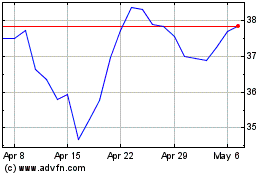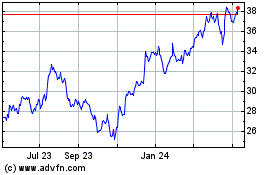By Christina Rexrode
CHARLOTTE, N.C. -- At Bank of America Corp.'s annual shareholder
meeting Wednesday, a 15-year-old brought up the elephant in the
room.
What is the bank doing to raise the share price?
That question came from Natalie Clarke, a ninth-grader who owns
5,000 shares given to her when she was a baby, but it echoed
challenges being raised by restless shareholders at a number of
banks as performance stagnates under low interest rates, new
regulatory burdens and volatile markets.
At Citigroup Inc.'s annual meeting this week, about one-third of
voting shareholders cast ballots against the bank's executive pay
plan, a reflection of the underperforming stock price. Some
investors at regional bank Comerica Inc., meanwhile, have called
for the bank to sell itself to a larger player.
And Miss Clarke was one of a number of investors in Bank of
America wanting to know when they might get a better value for
their shares.
Miss Clarke, who is getting her tonsils out Thursday, has
attended three consecutive Bank of America annual meetings, asking
questions about her father being laid off from the bank and how
much women were paid compared with men at the bank. Miss Clarke's
father has since been rehired.
The teenager said she has given more thought to the stock price
recently, since she has begun considering whether her shares could
help pay for college. She hopes to go to the University of Notre
Dame, where Bank of America Chief Executive Brian Moynihan attended
law school.
At the meeting, Miss Clarke rose to ask the CEO what the bank is
doing to become more efficient, a metric where it lags behind its
peers.
Mr. Moynihan replied that the bank would continue to cut costs.
"Good luck getting into Notre Dame," he added. "It is very
difficult these years."
Miss Clarke's questions were soon echoed by others. Mr. Moynihan
became CEO at the start of 2010, when the bank was still in crisis
mode, and spent the first several years slogging through mountains
of litigation and regulatory problems. But now that those are
largely in the past, he needs to show that he can boost shareholder
returns.
Through Wednesday, the shares are roughly flat since he became
CEO and down 11% so far this year, trading at about 2/3 of book
value. The share decline compares unfavorably with the 3.5% drop in
the KBW Nasdaq Bank Index and smaller drops among Bank of America's
largest peers.
"Obviously we feel the stock price should be higher," Mr.
Moynihan said at the meeting, adding that the bank is working to
show investors that it will be able to turn in steady earnings even
in another financial crisis. He said his entire net worth is tied
up with the company, and that he has never sold shares.
Throughout the meeting, Mr. Moynihan and other executives
repeated familiar themes for how the bank can improve earnings:
cutting costs; working to improve customer satisfaction; and adding
mobile-banking customers. Bank of America, with its large base of
U.S. deposits, has also been particularly hurt by low long-term
interest rates.
CLSA analyst Mike Mayo, who attended the meeting, asked whether
the bank needed to come up with a more drastic Plan B, like
breaking apart into smaller firms.
"There's a perception that you guys shine your shoes, go to work
and wait for interest rates to rise," Mr. Mayo said. He said later
that Miss Clarke's questions had encapsulated the concerns of other
investors.
In an interview, Miss Clarke said she was puzzled as to why the
bank raised the CEO's pay in a year when the share price was
down.
Bank of America's stock fell 6% in 2015, but the bank earned its
biggest annual profit in nearly a decade, and it raised Mr.
Moynihan's pay to $16 million from $13 million for 2014.
The bank said in regulatory filings that it made progress last
year in simplifying the company, pursuing responsible growth and
resolving mortgage-related matters.
Shareholders gave a vote of confidence to Mr. Moynihan, with
about 93% approving his pay package and those of other top
executives. All Bank of America board members were re-elected with
at least 94% approval.
Miss Clarke, who lives in Harrisburg, N.C., with her parents and
schnauzer-terrier mix pet dog, says she doesn't understand why more
shareholders don't take an active interest in the companies they
own. "There's a lot of people who own stock in Bank of America,"
Miss Clarke said, but at the annual meeting, "there's barely enough
to fill half a ballroom at a hotel." About 100 to 150 people
attended the meeting.
In 2002, around the time that Miss Clarke received her shares,
Bank of America's shares traded at an average of nearly $34. They
fell seven cents Wednesday to $15.02.
"You and I are both looking at some pretty bad numbers," Miss
Clarke told Mr. Moynihan.
Write to Christina Rexrode at christina.rexrode@wsj.com
(END) Dow Jones Newswires
April 29, 2016 02:47 ET (06:47 GMT)
Copyright (c) 2016 Dow Jones & Company, Inc.
Bank of America (NYSE:BAC)
Historical Stock Chart
From Mar 2024 to Apr 2024

Bank of America (NYSE:BAC)
Historical Stock Chart
From Apr 2023 to Apr 2024
